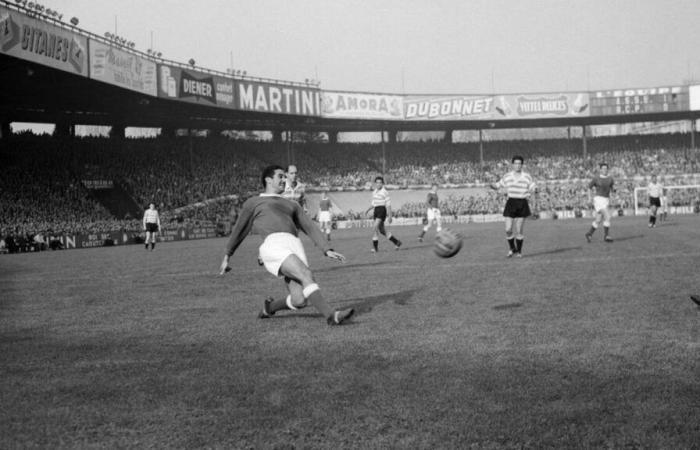With 25 goals scored, he was one of the great architects of AS Saint-Etienne’s first French championship title in 1957, which challenged the domination of Stade de Reims. Military world champion with France the same year, already called up four times for the French team by coach Albert Batteux, Mekhloufi seemed promised a brilliant future at the age of 21 and the 1958 World Cup in Sweden.
At Servette, with Snella
But in April 1958, in the middle of the Algerian war, he without hesitation left his club and the metropolis, accompanied by around twenty other Algerian players, to join the FLN team, created to promote the struggle for independence. . Like the Honved Budapest team, which became a traveling team multiplying friendly matches following the Budapest uprising in 1956, the leaders of the FLN imagined that a national selection, nicknamed the “Independence Eleven” , will promote the emergence of an “Algerian national identity” and will play the role of ambassador abroad.
Carried out in the greatest secrecy, the exfiltration of professional Algerian players to France (some refused) took place on April 14, 1958, while the French team was to play against Switzerland on April 16 in Paris (0-0) . Mekhloufi is not there, he joined Lausanne by car – a Simca Aronde – with the Lyonnais Abdelhamid Kermali. Of the 33 first and second division footballers who “deserted” in this way, he is the only one with Mustapha Zitouni (AS Monaco) to benefit from star status and a very comfortable salary. The sacrifice of their careers and their fortune has a very strong impact on public opinion and on their compatriots.
The players then meet in Tunis, where they remain based when they are not playing, mainly against Eastern Bloc countries. In four years, Rachid Mekhloufi played 40 matches and scored 43 goals for the FLN team. The Evian Accords, on March 18, 1962, marked the end of the war and the birth of independent Algeria. Rachid Mekhloufi can consider resuming his career at the age of 26. He still legally belongs to AS Saint-Etienne, which has fallen into the second division and wants to recover its jewel, but the climate is hardly conducive to this, and his physical form is precarious.
Then comes the idea of going through Servette, which Jean Snella joined in 1959. “Mekhloufi for a year in Geneva”, headlines the Geneva Journal of August 8, 1962. “He got stuffy, lost the rhythm of real competition after four years of exile,” notes Jacques Ducret in his book on Servette (L’Âge d’Homme, 1976). Snella, who can only field one of his two foreigners, nevertheless prefers him to Yugoslav full-back Tomislac Crnkovic. Rightly so since after a draw in Bienne (3-3), Mekhloufi scored three consecutive doubles against FC Basel, Grasshopper and FC Sion. He also scored twice against Feyenoord in the first round of the European Champion Clubs’ Cup, but Servette was eliminated in the support match.
The World Cup, finally
He is on the pitch for the famous derby against Lausanne which attracts 27,000 spectators to Charmilles. But LS wins (1-3) and takes off in the standings. The heavy soils of autumn are less favorable to it. At Granges, he looks like “the Kopa of bad days who get stuck in his dribbles”, tackles Jacques Ducret. Rachid Mekhloufi scored two goals in his last match for Servette, a very large victory in the Cup over Stade Lausanne (14-2) in front of 1,750 spectators on November 4, 1962 at Charmilles, then returned to Forez and the green jersey. He ultimately only stayed five months in Geneva, leaving mixed memories but remarkable statistics (14 matches, 12 goals).
In Saint-Etienne, where Jean Snella joined him in the summer of 1963, Rachid Mekhloufi very quickly found his feet and the affection of the public. For his coach, quoted by L’Equipe, Mekhloufi is “the breed of scholars from whom we have nothing to learn, who invent football. A pearl, the ideal partner. With him, the Greens were champions of France in 1964, 1967 and 1968, the year of the first cup-championship double. But he was pushed to the bench at the end of the 1968 season by the young Jean-Michel Larqué, who today mourns the death of “an immense player, my example, my model, my master as a professional”.
At 32, he left Saint-Etienne after 339 matches and 152 (second best historical total after Hervé Revelli). He became player-coach in Bastia for two seasons then hung up and became, three times, coach of the Algeria team that he helped to create. During his third mandate, he led the Fennecs with Mahieddine Khalef to an extraordinary 2-1 success over Federal Germany during the 1982 World Cup in Spain.
When his death was announced, tributes from Algeria and France highlighted the quality of the footballer but also of the man. While the place of politics in sport is heavily debated, Rachid Mekhloufi gave a worthy and strong expression.






